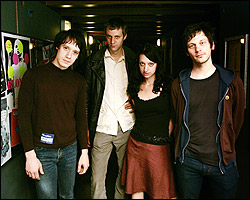LOST JOY
by Camden Joy
(TNI Books, $14)
Confounded Books, 2235 Second, 441-1377; 7 p.m. Tues., Oct. 8
YOU CAN’T ALWAYS trust a writer to give you the truth. Not the way you can trust your grandfather or the guy at the post office. The writer will often lie to you; he will twist what’s real. He will give you a story, and somewhere inside it, you will find a rock-solid spine of honesty, but wrapped around that honesty, like swaddling clothes—the kind you find in mangers on Christ children—there will be half-truths, make believe, and glorious, glaring lies. The writer simply can’t help his inventions, although it’s possible that he often wishes he could. If he could quiet the noise and stop the stories, lots of little things would be much easier—for example, life. And paying the rent. If he could concentrate on the hard facts and not just lollygag around the fiction, he could perhaps make a real stab at theory, social commentary, criticism, philosophy, whistle-blowing, encyclopedia entries: the relevant arts. Why, if he could just give up on whimsy and imagination, he could really get some shit done. But that isn’t anywhere near what the writer plans to do.
CAMDEN JOY is one of those writers that you ought not trust to tell you the truth because “Camden Joy” is fiction: His given name may be Tom Adelman, and he may now live outside of Boston, although it’s difficult to know for sure.
“Camden Joy” once played in bands and stood outside in the dull haze of Los Angeles nights because, really, what else is there to do, after you have just seen someone like the Circle Jerks or the Germs, but stand in a dull haze and think? Later, this “Camden Joy” joined the ’80s college-rock cult band Camper Van Beethoven for part of their tour and wrote a story about it. Some of it was true.
After that, he accidentally began writing music criticism for a L.A. newspaper and a national magazine called Puncture. “Camden Joy” wrote a book about someone named Camden Joy writing a book about a rock star named Liz Phair. “Camden Joy” drafted various constitutions and made daring declarations. He wrote some madcap manifestos and hung them in subway cars and on streetlight poles. He riffed on Memphis soul singer Al Green and former Pixies frontman Frank Black. He sent missives to quasi-alternative media and mainstream music organizations imploring them, by way of tall-tale telling and acerbic allegory, to get their collective head out of their collective ass.
And then people began to notice this “Camden Joy.” Ira Glass of NPR called him “one of the country’s most original music writers,” echoing the Rolling Stone assertion that he’s one of the “great rock writers of our age,” which Spin seemed to think, too. The Village Voice Literary Supplement called him a “renegade,” and meant it in a good way. None of which altered “Camden Joy’s” course of doing what “Camden Joy” does best. Which is, of course, telling glorious, glaring lies.
This month, local publishing company TNI Books—a renegade in its own right, based in Ballard—will release a collection of those lies, most of which have been lost, or at least unavailable, until now. Included in the volume, titled Lost Joy, are the texts of many of his missives, manifestos, and memos—along with a history book’s worth of photographs documenting his D.I.Y./self-published postering projects.
Also included is a story about a man whose best boyhood friend was named Cameron Joyce. The narrator recalls with great warmth that Cameron Joyce was an amazing soul. Someone worthy of a namesake. All 15 pages of the story are riddled with lies. I know because “Camden Joy” told me so.
“It turns out that art is just something I have to do,” he told me recently via e-mail. “More than make friends or have money, I have to exercise my imagination. I didn’t [always] want this to be true, but it is.”
WRITERS, PEOPLE NOT unlike our “Camden Joy,” are often saddled with some fairly serious contradictions and some pretty complicated ways of understanding reality. Or maybe it’s just that they work with unconventional definitions of veracity. Maybe postering and printing and telling stories can somehow change someone’s mind, but maybe none of it means anything at all. Really—how do you know what I’m telling you is even true? I’m a writer, too.









